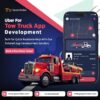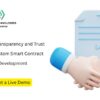
Terms of Reference (ToR) for Agricultural Mechanization and Tractor Matching Service Implementation Consultant
Description
1. Background
The Somalia Resilience Program (SomReP) has launched the Riverine & Pastoral Food System Strengthening (RFSS) project, funded by the European Union, to address the critical agricultural challenges faced by smallholder farmers in Somalia. With recurrent droughts and limited mechanization, farmers struggle to maintain productivity, affecting food security and livelihoods.
To address this, the RFSS project is implementing a Tractor Matching Service to connect smallholder farmers with available tractor services in the riverine regions. The service will use digital platforms, including integration with Shaqodoon’s M-Dalag platform, to match farmers with tractor owners, boosting mechanization and improving agricultural productivity.
The service will be piloted in five target districts: Luuq, Dolow, Bulo Burte, Jowhar, and Afgoye, with the potential for scaling across other areas based on results and stakeholder feedback. The consultant is expected to develop and implement a sustainable, technology-driven business model that addresses the mechanization needs of smallholder farmers while promoting economic recovery and social inclusion.
2. Objectives of the Consultancy
The key objectives of the consultancy are:
o assess the current state of tractor services in Somalia’s riverine regions by mapping service providers, understanding connection mechanisms between farmers and tractor owners, and analyzing service availability, pricing, and accessibility.
To evaluate the market demand for tractor services by estimating the number of farmers in need, identifying key characteristics such as farm size, crop type, and geographical distribution, and determining the frequency of tractor use among smallholder farmers.
To analyze alternative farming methods used by farmers when tractors are unavailable, assessing the cost, efficiency, and limitations of these alternatives in comparison to mechanized services.
To determine the technological readiness and preferences of farmers for accessing tractor services, identifying preferred methods such as mobile applications, local agents, or cooperatives, and evaluating their access to and familiarity with digital tools.
To develop a comprehensive database and information system that provides an overview of tractor availability, service areas, pricing models, and operational efficiency, laying the foundation for a digital tractor matching service.
To Propose a sustainable business model for connecting farmers with tractor services through a digital platform.
3. Scope of Work & Methodology
The consultant will adopt the following phases approach:
3.1 Scope of Work
Organize training workshops on data collection methodologies, survey techniques, and the use of digital tools.
Map existing tractor service providers, and record service areas, tractor types, availability, and contact details.
Conduct surveys and focus group discussions with smallholder farmers to document current tractor access mechanisms and the cost of services (hourly or per service).
Identify and analyze alternative farming methods (e.g., animal traction, manual labor) and their cost-effectiveness.
Estimate the number of farmers needing tractor services using surveys, agricultural census data, and input from cooperatives and local agricultural extension services.
Segment the farmer population by farm size, crop type, geographical location, and tractor use frequency.
Collect data on current pricing models for tractor services, including hourly, per-acre, and seasonal rates.
Analyze cost components like fuel, maintenance, labor, and profit margins based on interviews with tractor owners and service providers.
Survey farmers to understand their preferred methods of accessing tractor services (mobile calls, apps, cooperatives, agents).
Assess farmers’ technological readiness, including access to mobile phones and internet connectivity, to gauge their comfort with digital solutions.
3.2 Methodology
Utilize digital data collection tools such as mobile apps and GPS-enabled mapping software.
Implement a mix of quantitative surveys and qualitative methods (focus group discussions and interviews) to gather data from farmers and tractor owners.
Analyze all collected data to identify trends, challenges, and opportunities.
Prepare a comprehensive report with recommendations for improving access to tractor services, including a potential business model for sustainable mechanization delivery.
Share and validate findings with stakeholders through workshops and discussions to ensure alignment with local needs and gather additional insights.
4. Deliverables
The consultant (s) will be responsible for delivering:
A comprehensive research report covering all the findings, analysis, recommendations and testable business model from the entire research process
List and detailed information of the tractor owners, cooperatives, and other relevant stakeholders.
5. Consultant Qualifications
The selected consultant or consultancy firm should possess the following qualifications:
Proven expertise in agricultural mechanization, with a focus on rural and smallholder farming systems.
Advanced degree in economics/agricultural economics, rural development, and/or technology-based solutions for agriculture.
Demonstrated strong background and experience in conducting market research, stakeholder engagement, and data-driven analysis within the agricultural sector.
Demonstrated ability in developing sustainable business models, particularly in rural or agricultural sectors.
Familiarity with Somalia’s agricultural landscape, including experience working with smallholder farmers, tractor owners, cooperatives, and local institutions.
Expertise in training and managing field teams (e.g., researchers, enumerators) in data collection, survey techniques, and digital tools.
6. Timeline
The consultancy is expected to be completed within 2 months, with the following key milestones:
Week 1-2: Research tool development, stakeholder mapping, inception report and enumerators training
Week 3-5: Research data collection, analyzing and final development
Week 5: Presenting the final research finds to Shaqodoon
How to apply
7. Application Process
Qualified applicants are invited to submit their proposals by October 15th 2024 to jobs@shaqodoon.org. Applications should include a detailed project plan, methodology, budget breakdown, and relevant experience. Evaluation criteria will consider experience, methodology, and cost-effectiveness. Please mention “Tractor Matching Service Consultant” in the subject line of the email.
Location
Report abuse
Report abuse
Featured listings
More from this user
You may also like...


















